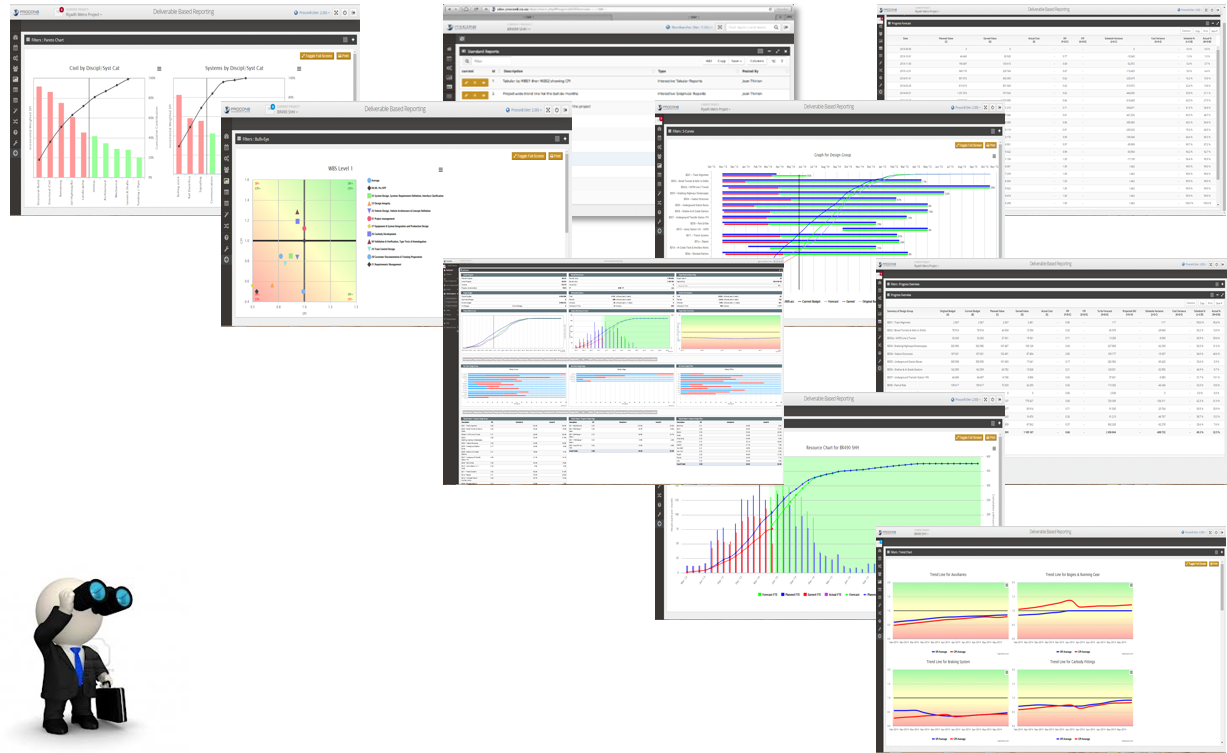
Project Control
Project Control is an independent function reporting directly to the Project Director and is often described as the conscience of a project. Nowadays most projects are managed in a matrix organisation.

Contract Management
Effective Contract Management is essential for a project to be successful. The contract represents the agreed rights and obligations made by each party to one another.

Specialist Services
Our specialist services are aimed at providing advanced levels of expertise in certain key areas of Project Management.They include services in both the bid and execution phase of a project.

Reference Projects
Our employees have considerable Project Control and Contact Management expertise gained from the numerous projects we have been directly involved with.
About Our Company
PROCON8 CONSULTING SA provides project control and contract management expertise to the engineering / construction and manufacturing industries. We are able to draw from the vast experience of our specialist resource base. Our employees have considerable experience gained from direct involvement on numerous large scale international projects. These projects include civil, building, infrastructure and defence with particular focus on the rail and aviation transportation sectors. Our employees possess the practical experience necessary to implement world class Project Control / Project Management systems and processes.

Our Commitment
About us
PROCON8 CONSULTING SA provides project control and contract management expertise to the engineering / construction and manufacturing industries. We are able to draw from the vast experience of our specialist resource base.

Our employees have considerable experience gained from direct involvement on numerous large scale international projects. These projects include civil, building, infrastructure and defence with particular focus on the rail and aviation transportation sectors. Our employees possess the practical experience necessary to implement world class Project Control / Project Management systems and processes. Each of our employees have a minimum of 15 years relevant experience. Once deployed to support a specific project, we are able to work with the project team to define the Project Control and Contract Management requirements, establish the plan for implementation and drive the setup through to completion. We follow the (D)efine, (M)easure, (A)nalyse, (I)mplement and (C)ontrol (DMAIC) process and ensure our customers are involved in the development at all times. At PROCON8 CONSULTING SA we believe our contribution is best realised during the early stages of a project when the opportunity to influence the outcome of the project is still very high. We work with our customers to ensure our systems and processes are embedded within the day-to-day activities of the project. By doing this we ensure they become "used and meaningful" tools by which the project team is able to make informed management decisions based on reliable and accurate information. Our systems and processes have been tried and tested on numerous projects world-wide and are based on best practice.
At PROCON8 CONSULTING SA we value our relationship with all of our customers. We are committed to providing value for money solutions within agreed timeframes. We have a reputation for communicating openly and honestly and are prepared to report contentious issues when we believe it is in the best interest of the project. Our employees are highly skilled, motivated and mobile and are trained to act as mentors and coaches to ensure the project team is able to develop this expertise in-house.
Project Control
Contract Management
Contact us

Overview
Our Project Control System (PCS) is based on the establishment of an approved project baseline. The baseline is developed within a reasonable period of time (typically three months) post Notice to Proceed (NTP) and reflects the contractual commitments made during the bid phase. This baseline establishes the scope, cost and schedule commitments necessary to realise the "as sold" project commitments. At PROCON8 CONSULTING SA we believe the establishment of this initial baseline is crucial to the success of all projects both in terms of achieving the obligations under the contract as well as meeting the shareholders' expectations. Once implemented, the baseline is used as a reference tool to measure deviation / variance on a monthly basis. This constant validation process reduces surprises to the project team as well as the customer. It allows decisions to be made in a timely manner to develop effective mitigation measures to return the project to a desired outcome. The initial baseline does not change except to include subsequent approved changes (current baseline). In order for the PCS to work effectively we ensure integration between the various disciplines within Project Controls. Scope control, cost control, schedule control, change control and risk management are all integrated through the use of a common Work Breakdown System (WBS) to ensure an holistic approach to measuring project progress and performance.

Our Contract Management System (CMS) recognises that all projects are subject to change and that changes are an accepted part of the contracting process. Ideally these changes are handled in a non-adversarial manner but sometimes, unfortunately conflicts may arise. The project team must be able to continue functioning without being distracted from their primary responsibility of delivering the project. The CMS emphasis ensures that all project team members are familiar with the contractual obligations under both the prime (upstream) and sub / supplier (downstream) contracts. The CMS is closely aligned with the PCS to ensure these contracts are baselined by identifying the contract requirements. Once established the CMS ensures the day-to-day execution of the project is carried out in accordance with these requirements. This approach promotes a transparent, open and honest relationship between all contracting parties.
At PROCON8 CONSULTING SA our approach to both these systems is carried out in a practical, hands-on manner. Our world class systems and processes are readily adaptable to any project environment as they are based on powerful yet simple to understand concepts. We believe in getting things right the first time and eliminating non value added steps. Our approach to Project Control and Contract Management is based on time proven techniques and focuses on the elimination of wasteage within the project team. We are an ethical organisation committed to the advancement of Project Control and Contract Management.
Project Control
Contract Management
Project Control
Project Control is an independent function reporting directly to the Project Director and is often described as the conscience of a project. Nowadays most projects are managed in a matrix organisation. If the same consistent message is being communicated to senior management by Project Control as it is from another function, the organisation is assured it is proceeding on reliable information. If this is not happening the project team is able to challenge the analysis thereby ensuring management information is constantly being improved. The increasingly competitive global market has resulted in more projects being awarded on a lump sum basis. This requires stringent control mechanisms to be impelemented to realise the project objectives of on-time or early completion and on-budget or better financial results.
Project Control commences with the establishment of the Project Control Plan. The Plan identifies the deliverables, assigned responsibility, tools, procedures and frequency of issue for each of the disciplines of Cost Control, Schedule Control, Change Control and Risk & Opportunity Management. This Plan represents the Project Control departments strategy for discharging its reponsibilities on the project. It forms the basis by which the effectiveness of the function can be measured and allows the rest of the project team to have a clear understanding of how they will be supported.
Once the Plan is established the Project Control department establishes the project baseline, thereby ensuring that exception reporting is established to allow the project team to be informed of deviations. Change Control is implemented immediately after the establishment of the project baseline by establishing the Cost Budgets using the code of accounts as well as the Control Schedule. Once these controls systems have been established and approved, the project team is able to make a more accurate assessment on the contingency and risk provisions inherited from the bid process.
Reporting is a key requirement of the Project Control function. Reports are developed based on accurate and factual data and converted into meaningful management information. We pride ourselves on our ability to convert complex data into management information. This skill is often overlooked on large complex projects resulting in data overload to the project team. This data overload may render the Project Control function obsolete due to the difficulty experienced by the rest of the organisation in interpreting the data.
Effective scheduling is a fundamental component to the success of any project. Most claims and disputes are influenced greatly by the effectiveness of the project teams' scheduling approach. Scheduling should be carried out using an holistic approach. We develop schedules based on a Hierarchical approach. This includes high level Management Schedules, Contract Schedules, Detailed Working Schedules and S-Curves. Our approach to scheduling has enabled projects to develop strong commercial strategies in the knowledge they are underpinned by accuarate assessments of time impacts and entitlements.
The following is a list of the control systems we provide by discipline:
- Cost and Schedule Integration
- Bid / Proposal Preparation
- Project Control Plan
- Project Code of Accounts
- Budget Control
- Labour (manual / non-manual) Control
- Material and Sub Contract Control
- Forecasting
- Project Cash Flow and Working Capital
- Reconciliations
- Scope Change Control
- Engineering Control
- Schedule Hierarchy
- Milestone Summary Schedule
- Engineering Control Schedule
- Procurement Control Schedule
- Construction Control Schedule
- Production Control Schedule
- Detailed Implementation Schedules
- Testing & Commissioning Control Schedule
- Quantity Tracking
- Progress & Performance Curves
Contract Control
- Supplier / Sub-Contractor Requirements
- Progress and Performance Reporting
- Critical Issue Reporting
- Variance Reporting
- Management Reporting
- Schedule Change Notices
- Schedule Impact Management
- Schedule Claim Analysis
- Customer / Client Changes
- Partner Changes
- Internal Changes
- Supplier / Sub-Contractor Changes
- Risk and Opportunity Identification
- Identification of Mitigation Actions
- Quantitative Risk Analysis (Monte Carlo)
- Contingency and Risk Provision Establishment
- Audits
- Gate Reviews
ConTRACT Management
Effective Contract Management is essential for a project to be successful. The contract represents the agreed rights and obligations made by each party to one another. In addition there may be many underlying obligations, some stated explicitly in the contract while others may be implied. These obligations form the baseline frame of reference. PROCON8 CONSULTING SA will assist the project team to identify the contract baseline deliverables. Once identified we will complement existing systems with our Contract Management System (CMS) to highlight any deviations from the baseline. These deviations may be categorized as 'recoverable' or 'non-recoverable' based on the contract itself. We will assist the project team to recover all deviations that should be for the customer's account and also look for opportunities to reduce the exposure of those deviations that are non-recoverable.
A useful tool in effective contract management is the Responsibility Assignment Matrix. For each contractual responsibility the matrix identifies a specific individual who is to perform or ensure performance of the responsibility. Due by dates are identified and tracked on the Contract Management Schedule. All instances requiring notices under the contract are identified and tracked to ensure that the project team does not lose its entitlement to claim due to time barring constraints. The Contract Management System (CMS) contains a number of processes, tools and procedures, in some cases unique and other cases common, to the prime and sub / supplier contracts.
Prime Contract Administration
Prime Contract Administration provides confidence to the customer that the project is well managed, transparent and surprises and conflicts are minimised. It ensures that the contractor is paid for the work it does and allows the project team to carry out their day to day tasks in the knowledge that they are working in a predictable environment. Prime Contract Administration deals with the contract issues, the payment mechanism, notices and disputes with the customer, deviations from the contract baseline and ensures the contractor recovers its entitlement when change occurs.
The following is a list of the control systems we provide by discipline:
- Contract Appraisal Meeting
- Responsibility Assignment Matrix
- Milestone Payments
- Progress Payments (Percent Complete)
- Advance Payments
- The Contract Baseline
- Change Requirements
- Contract Management Schedule
- Schedule Claims Analysis
- Schedule Impact Management
- Milestone Payments
- Progress Payments (Percent Complete)
- Advance Payments
Bonding
- Customer vs Contractor Obligations
- Correspondence vs Technical Submissions
Sub Contract Administration
Depending on the contracting arrangement adopted by the contractor certain scope work may be sub contracted to a third party (sub contractor / supplier) due to the specialist nature of the work. In many instances the amount of work sub contracted may in fact exceed the work to be performed directly by the principal contractor. While the work may be sub contracted on a lump sum basis, it remains vital to the project team to manage these sub contractors to ensure a successful outcome for the project. Sub contract management (administration) is often a complex and time consuming task especially if the systems and processes needed are not sufficiently mature. Our approach is to equip the project team with these systems and processes, procedures and tools to enable them to quickly implement the control required without expending significant time developing a sub contract administration system.
The following is a list of the Sub Contract Administartion systems we provide:
- Contract Baseline Schedule
- Monthly Reporting Requirements
- Site Instructions
- Requests for Information (RFI)
- Change Requests
- Mobilisation Plan
- Resource Plans
- Quality Management Plans
- Milestone Payments
- Progress Payments (Percent Complete)
- Advance Payments
- Schedule Claims Analysis
- Schedule Impact Management
- Notices and Claim Preparation
- Liquidate Damages
- Milestone Payments
- Progress Payments (Percent Complete)
- Advance Payments
- Correspondence vs Technical Submissions
Specialist Services
PROCON8 CONSULTING SA will review the Request for Proposal (RFP) and extract the salient deliverables (technical and commercial) to develop a table of contents for the response. We will assist the proposal team to prepare the RFP response by developing management plans for all project functions and disciplines as well as writing and proof reading the technical submission documents to ensure a consistent and professional approach. Our support will include the development of the Bid Schedule and associated Project Control deliverables.
The greatest opportunity to positively or negatively affect the outcome of a project, both in terms of schedule and budget, is during the Engineering phase (this is well depicted in the "Influence vs Time" curve). Due to the difficulties associated with measuring progress and performance of design deliverables, this is an area that is often poorly managed. Many project teams struggle to assess their status during this critical phase of a project resulting in failure before the first component has been manufactured or installed. Nowadays design deliverables are electronic in format and it is only when various layers of a drawing are combined together and plotted that the team realises whether the deliverable was completed on schedule and budget.
Engineering EVM is based on the identification of design deliverables, assigning planned start and finish dates and intermediate control points. Each control point has a clear definition and is monitored bi-weekly to assess progress against plan. The resulting Schedule Performance Index (SPI) allows the project team to make decisions to improve progress such as the re-allocation of resources. The project time keeping system may also be linked to these deliverables (at a summarised level), using the work breakdown structure, to provide a Cost Performance Index (CPI). If used correctly the SPI and CPI metrics become powerful tools by which the project team is able to manage this critical phase effectively. EVM is often referred to as "management with the lights on".
PROCON8 CONSULTING SA will assist your project to implement EVM during the Engineering phase and if desired through subsequent project phases. Our employees are trained in EVM and have successfully implemented the system on numerous projects.
S-Curves are a powerful means of depicting work volume against time. These curves allow the project team to visualise the schedule to understand whether it is achievable and to determine periods of high resource demands. Schedules are easily manipulated by reducing durations and changing activity relationships to produce a "desired" outcome, however S-Curves always measure delay to progress as well as delay to completion. Delay to progress shows the team where they should be today regardless of what has been done to future activities in the schedule. This variance reporting allows the team to understand how far behind schedule they really are and whether the recovery schedules are realistic.
Critical issues are defined as issues currently affecting the project critical path or if left unattended to have the potential to affect the critical path in the future. Critical issues are identified during schedule updates and mitigation actions assigned with due by dates. These critical issues are monitored closely and status reported at the project team weekly meetings.
On large scale projects many schedules end up with thousands of activities due to the complexity of the project. These schedules are vital to control and direct activities but are difficult for the project team to interpret due to the significant amounts of data contained in them. Management Schedules are developed at a summary level depicting progress against the contractual commitments. These schedules are derived from the detailed working schedules but allow the project team to review the status of the project at a glance. The Management Schedule is usually a static picture based on the project baseline with a vertical status bar showing if the project is ahead or behind schedule.
PROCON8 CONSULTING SA believes that to successfully implement systems and tools, processes and procedures on projects usually require employees to change their behaviour. In other words these initiatives are only really effectively implemented through effective change management. We are strong advocates of the Six Sigma and Lean methodologies and base our analysis on facts rather than anecdotal evidence. By doing this we ensure our results are factually correct thereby creating the desired pressure to cause people to change their behaviour.
Coaching / Mentoring / Training
We are able to provide coaching, mentoring and training to existing staff members. We have a structured approach to up-skilling a company's existing employees in the use of Project Control and Contract Management systems and processes. Our approach is based on hands-on involvement with the employees being trained. We are able to transfer our knowledge to these employees through 'one on one' consultation as well as group workshop training courses. Our aim is to facilitate the learning process to enable employees to gain exposure to advanced methods of Project Control and Contract Management thereby enabling them to add maximum benefit to the project.
Project Control
Contract Management
Deliverable Based Reporting (Quantivia™)
In our experience, having been involved with many large scale projects all over the world, a significant contributor to project failure is poor planning and scheduling.
- Skilled schedulers are difficult to find
- Usually expensive so there's a tendency to use under-qualified resources
- Project teams do not know how to interpret schedule data
- Schedulers are unable to convert data into management information
- Schedule "discipline" is usually weak e.g. no formal schedule change control
- Schedules are either too summarized or too detailed
- Relationships become meaningless
- Statusing (% complete and forecast dates) is usually highly subjective
Project Management with the Lights On

|
|
Questions Quantivia™ helps with
- Is the project ahead or behind schedule?
- How efficiently is the project using time?
- When is the project likely to be completed?
- Is the project currently over or under budget?
- How efficiently are resources being used?
- What is the likely cost of the remaining work?
- By how much will the project be over or under budget at the end?
- Where are problems occurring (pinpointing)?
- View Online
Quantivia™ Benefits
- Applicable across all industries, sectors and projects
- Significantly reduces the amount of subjectivity
- Promotes structure and discipline
- Information is web based (allows users to log in remotely)
- Easy to read reports (standardised formats - universal indicators)
- Administration requires a lower skill level compared to a Project Planner
- Facilitates effective resource planning
- Trends are visible within a couple of reporting periods
- Allows project managers to target specific problem areas
- Easy to install, configure and customize
- Interactive Dashboard
- Calendar (Meetings, Events, Risks, Actions)
- User access restrictions
- Comprehensive and Intelligent Help Menu
- Change Control functionality
- Integrated Actions and Risk Register
- Theme Selection (client customization)
- Budget Reconciliation
- Bug logging / feature requests
- Powerful tabular and graphic reporting (pivot effect)
- Data integrity checking through Tables
- Wizards for up/downloading unlimited records
- Status is based on forecasting dates NOT guessing percent complets
- View Online
Reference Projects
The following list represents some of the projects our employees have been directly involved with.
RAIL - PROJECTS
- Gautrain Rapid Rail Link
- Hong Kong West Rail
- Cross Country Route Modernization
- Cross Rail
- Jubilee Line Extension Project
- Portland Light Rail Project
- King Abdulah Financial District
- Expresso Tiradentes
- GoldLinkQ
- Johannesburg
- Hong Kong
- Birmingham
- London
- London
- Portland, Oregon
- Riyadh
- Sao Paulo
- Gold Coast
- South Africa
- Hong Kong
- England
- England
- England
- USA
- Saudi Arabia
- Brazil
- Australia
AVIATION - PROJECTS
- New Doha International Airport
- New Hong Kong International Airport
- Doha
- Hong Kong
- Qatar
- Hong Kong
MANUFACTURING - PROJECTS
- SBB Twindexx FV Dosto
- Zurich
- Switzerland
BUILDING
- Galleria Shopping Centre
- Sanlam Head Office
- Cape Town
- Cape Town
- South Africa
- South Africa
The following list represents some of the bids / proposals our employees have been directly involved with.
RAIL - BIDS
- GoldLinkQ
- Sydney Metro
- Hiawatha Light Rail Proposal
- National Signalling Programme
- National Signalling Programme
- Gold Coast
- Sydney
- Minneapolis
- Birmingham
- Johannesburg
- Australia
- Australia
- USA
- UK
- South Africa
INFRASTRUCTURE - BIDS
- Lusail Project
- New Doha Port
- Doha
- Doha
- Qatar
- Qatar
